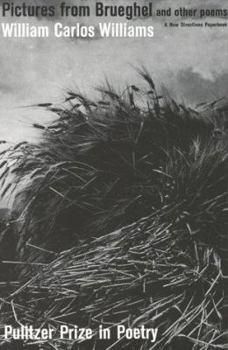Pictures from Brueghel: Pulitzer Prize, Poetry
Select Format
Select Condition 
Book Overview
This collection makes available work of one of our greatest American poets in the last decade of his life. The first section, Pictures from Brueghel, contains previously uncollected short poems, while the second and third parts are the complete texts of The Desert Music (1954) and Journey to Love (1955), originally published by Random House. In these books, Dr. Williams perfected his "variable foot" metric and achieved full mastery of the "American...
Format:Paperback
Language:English
ISBN:0811202348
ISBN13:9780811202343
Release Date:January 1967
Publisher:New Directions Publishing Corporation
Length:184 Pages
Weight:0.47 lbs.
Dimensions:0.5" x 5.4" x 8.0"
Related Subjects
Landscapes Love And Relationships Politics And Society Urbanization Nature's Beauty PoetryCustomer Reviews
3 ratings
Excellent, if flawed, selection of Williams' work.
Published by Thriftbooks.com User , 22 years ago
William Carlos Williams, Pictures from Breughel and Other Poems (New Directions 1962)Pictures from Breughel, the 1962 Pulitzer Prizewinner in poetry, is an excellent example of how far poetry has strayed from where it should be. I doubt you will find a serious scholar of twentieth-century American poetry anywhere on the planet who would dispute the influence of William Carlos Williams on almost everything that has come since, and you will probably find even less who would be willing to come right out and say there's anything in this book deserving of less than worship. But there are dissenting opinions, and mine is one of them.When Williams was on his game, he was one of America's finest poets. Problem is, Williams wasn't always on his game. A non-trivial amount of the work in this collection-perhaps a quarter of it, all told-is that hobgoblin of all poetry magazine editors, "prose cut up into lines." There is simply nothing poetic about some of the poems therein. While I was still in college, one of my professors mentioned that Williams (in the long poem Paterson, not a part of this book) used a grocery list as a piece of a poem, and then went on to ask us whether that was actually poetry. It was obvious from the context that he was looking for a yes. I thought then, and I still think, the answer to that question is painfully obvious, and I would have gotten it wrong in that class. And we wonder why poetry today isn't read?Don't get me wrong. There is much here of great worth, including the classic love poem "Asphodel, The Greeny Flower." It is long, and stumbles in places, but is still one of the finest examples of the long poem in twentieth-century American poetry. This is a book well worth the time and effort, but if you stumble across something in it and find yourself wondering why both author and publisher considered it a poem, rest assured you're not alone. *** ½
Only the Imagination ...
Published by Thriftbooks.com User , 26 years ago
This is a very fine survey of Williams' poems written in a ten year period spanning the 50s and early 60s. At first, I found Williams' somewhat unusual forms difficult, but discovered that with a little patience (and reading the poems aloud to myself) I was able to connect and the poems began to resonate. I found great wisdom and beauty. The volume concludes with "Asphodel, That Greeny Flower," a stunning, sweeping love poem (despite its peculiar title.) The poem weaves together Williams' reverence for poetry, his artistic vision, and his political philosophy all in the context of a very personal and touching love poem which builds to a powerful climax. The book's cover quotes W.H. Auden's comment that this is "one of the most beautiful love poems in the language." I concur. This is the poem that includes Williams affirmation of the value of poetic consciousness in a politcal and social conext: It is difficult to get the news from poems yet men die miserably every day for lack of what is found there. It also contains Williams exilerating affirmation: Only the imagination is real!
A great book of poems by an essential poet
Published by Thriftbooks.com User , 26 years ago
This collection of poems from Williams's later years is ripe with the mastery of his craft. Uneven at times, as he always was, these poems reflect his later experiments with the "variable foot" and his turn towards a more philosophic tone that came after his series of strokes in the fifties. What they also show is that Williams was at the end of his life (not unlike W.B. Yeats) once again renewing himself and even reinventing himself --like America. Truly these are great American poems.






